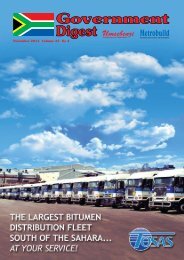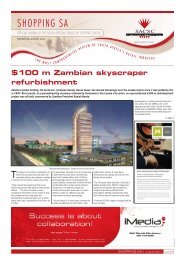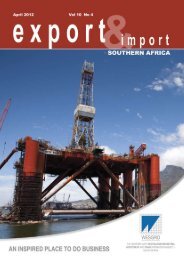April 2011 - Malnor
April 2011 - Malnor
April 2011 - Malnor
Create successful ePaper yourself
Turn your PDF publications into a flip-book with our unique Google optimized e-Paper software.
thousands of protestors had been out on the streets of<br />
Jordan’s cities, angry over a stagnant economy, upset<br />
with government corruption and demanding that senior<br />
political leaders resign.<br />
Recent economic highlights<br />
�<br />
�<br />
�<br />
�<br />
�<br />
�<br />
Jordan’s economy is among the smallest in the Middle<br />
East, with insufficient supplies of water, oil and other<br />
natural resources, underlying the government’s heavy<br />
reliance on foreign assistance. Jordan is ranked among<br />
the five most water poor countries in the world. Because<br />
of short supply of water many households receive water<br />
only once or twice a week. Poor connections and leaking<br />
pipes mean that even available water does not always<br />
reach some homes and businesses.<br />
Other economic challenges for the government include<br />
high rates of poverty and unemployment, with an<br />
estimated 12% of the population unemployed and 25%<br />
living in poverty, as well as inflation and a large budget<br />
deficit. King Abdallah has implemented significant<br />
economic reforms such as opening the trade regime,<br />
privatising state-owned companies and eliminating most<br />
fuel subsidies, which in the past few years have spurred<br />
economic growth by attracting foreign investment and<br />
creating some jobs.<br />
Food prices increased by 15% between October 2010<br />
and January <strong>2011</strong>; this could lead to a higher cost of<br />
living and a rise in poverty levels since Jordan imports<br />
over 90% of its food needs.<br />
The global economic slowdown has depressed Jordan’s<br />
GDP growth. Export-oriented sectors such as<br />
manufacturing, mining and the transport of re-exports<br />
have been hit the hardest. The Government approved<br />
two supplementary budgets in 2010, but sweeping tax<br />
cuts planned for 2010 did not materialise because of<br />
Amman’s need for additional revenue to cover excess<br />
spending. The budget deficit is likely to remain high with<br />
Amman continuing to depend heavily on foreign<br />
assistance to finance the deficit in <strong>2011</strong>. Jordan’s<br />
financial sector has been relatively isolated from the<br />
international financial crisis because of its limited<br />
exposure to overseas capital markets.<br />
Due to the unrest in the region, Finance Minister<br />
Mohammad Abu Hammour stated that the forecast<br />
growth in GDP for this year has been adjusted to 4%<br />
from the previous 5% growth projection.<br />
According to the International Monetary Fund (IMF)<br />
government debt was forecast to reach 67,1% of GDP by<br />
the end of 2010, while the fiscal deficit came down<br />
during the course of the year, falling by around 35% to<br />
$808,91 million, compared with $1,23 billion during the<br />
same period in 2009. The inflation rate was 6,1% in<br />
December 2010, rising by 1,5% from the previous<br />
EXPORT & IMPORT SA // APRIL <strong>2011</strong><br />
�<br />
�<br />
�<br />
�<br />
�<br />
month. Standard & Poor’s rating agency cut its long-term<br />
local-currency rating to BB+ or junk.<br />
Thanks to multiple bilateral agreements, Jordan has<br />
become one of the most open economies. Setting up<br />
business in Jordan offers prospects not only for<br />
expansion on the local market, but also to neighbouring<br />
countries because of the re-exporting platforms.<br />
Jordanian authorities are also encouraging investments<br />
by promoting special conditions for foreign investors at<br />
the 13 special economic zones (QIZ).<br />
Lebanese Prime Minister Saad Hariri announced in late<br />
December the formation of the Mashreq (Levant)<br />
Business Forum, which includes Lebanon, Turkey, Syria<br />
and Jordan. The forum’s goal is to promote free trade in<br />
the region. Fourteen sectors were identified as being a<br />
priority including industry, agriculture, science, finance,<br />
tourism and oil. The forum will represent the private<br />
sector in the four countries, which have agreed to<br />
tighten economic ties between representatives of their<br />
private sectors. The volume of trade between the four<br />
countries amounts to $12 trillion.<br />
Jordan is currently exploring nuclear power generation to<br />
forestall energy shortfalls. Jordan relies almost entirely<br />
on imported energy and is turning to nuclear power to<br />
meet increasing electricity demand. It plans to build<br />
reactors by 2019 but it will first need to choose a<br />
supplier of its first nuclear plant within 1H11. It has<br />
signed nuclear-cooperation agreements with 11<br />
countries, most recently with Italy in February this year.<br />
Jordan’s Ministry of Planning and International<br />
Cooperation (MOP) has released its Executive<br />
Development Programme (EDP) for <strong>2011</strong>-13 with<br />
$8,4 billion to be distributed among 24 different<br />
economic sectors. Around 55% of the spending will be<br />
allocated to infrastructure, water, housing and<br />
transportation projects; 20% to social welfare; 14% to<br />
education; 6% to improving business practices; 3% to<br />
modern technical training; 2% to financial and<br />
administration reforms; and 1% to legislation. Some of<br />
the EDP’s planned projects will rely on public-private<br />
partnerships for funding, particularly for large projects<br />
such as the National Railway Network.<br />
According to the finance minister, strong demand for<br />
Jordan’s upcoming debut Eurobond issue will help a<br />
rebound in FDI, underpinned by the country’s macroeconomic<br />
fundamentals and political stability. The<br />
minister did not disclose the size of the issue but<br />
investment bankers have estimated Jordan is seeking<br />
not less than $500 million depending on the level of<br />
demand and the right pricing. In early March Moody’s<br />
said it assigned a BA2 rating to the proposed senior<br />
unsecured bond while Standard & Poor’s Ratings<br />
Service said it assigned it a BB long-term debt rating.<br />
Latest trade developments<br />
�<br />
�<br />
�<br />
�<br />
�<br />
Credit Guarantee country profile<br />
Major exports: clothing, fertilizers, potash, phosphates,<br />
vegetables and pharmaceuticals.<br />
Major imports: crude oil, machinery, transport<br />
equipment, iron and cereals.<br />
Main trading partners: Saudi Arabia, China, US,<br />
Germany, Iraq, India, Syria and UAE.<br />
SA exports to Jordan totalled R153 million in 2008,<br />
R244 million in 2009 and R186 million in 2010.<br />
SA imports from Jordan totalled R237 million in 2008,<br />
R98 million in 2009 and R104 million in 2010. ◆<br />
25
















